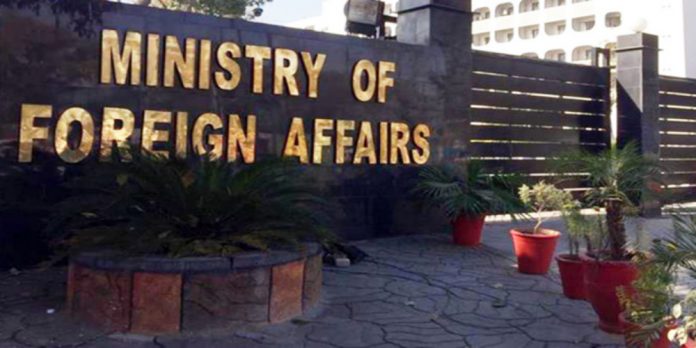By Our Diplomatic Correspondent
ISLAMABAD: Pakistan and Afghanistan are engaged in constructive dialogue aimed at achieving a peaceful resolution to ongoing border tensions, the Foreign Office said on Friday.
In his weekly press briefing, FO spokesperson Shafqat Ali Khan said Pakistan had repeatedly informed Kabul about the presence of Fitna al-Khawarij within Afghanistan.
He expressed deep concern over the Taliban’s “provocative attacks” along the border between October 11 and 15, which Pakistan effectively repelled in self-defence.
The spokesperson said Taliban forces and terrorist hideouts under their use suffered significant losses. “Our retaliatory action was against terrorist elements, not civilians,” he stated, adding that a 48-hour ceasefire was enforced from 6pm on October 15 at the Taliban’s request.
Khan said both countries are engaged in constructive talks for a peaceful resolution. Pakistan expects the Taliban government to take concrete action against terrorist elements and ensure Afghan soil is not used for terrorism, in line with its commitments.
He further added that Pakistan respects Afghanistan’s sovereignty and seeks dialogue and cooperation to address the shared challenge of terrorism.
“The recent contacts between the two countries reflect mutual trust and understanding,” the spokesperson added.
He praised Saudi Arabia’s traditional diplomatic approach aimed at promoting stability and reducing tensions in the region.
Regarding reports of ceasefire violations, the spokesperson said detailed information could be obtained from the ISPR.
The spokesperson said the ceasefire had been initiated at the request of the Afghan Taliban and was enforced for 48 hours. He added that the ceasefire arrangement was finalised entirely through bilateral diplomatic communication. The Taliban, he noted, had directly approached Pakistan for a ceasefire.
He rejected the Taliban’s claim that the ceasefire had been requested by Pakistan, terming it incorrect.
The spokesperson clarified that there has been no fundamental change in Pakistan’s policy towards Afghanistan, only a slight shift in the way its position is articulated.
He confirmed that the embassies of both Pakistan and Afghanistan in Islamabad and Kabul are functioning as usual.
Pakistan’s policy is based on diplomacy, stability, and peace, he said.
He added that Pakistan has hosted over four million Afghan refugees for four decades and will continue to regulate the presence of foreigners on its soil in accordance with international norms and domestic laws.
“Pakistan wishes to see a peaceful, stable, and prosperous Afghanistan,” Khan said, expressing hope that the Afghan people would one day live freely under a representative and inclusive government.
The spokesperson also voiced Pakistan’s serious reservations over the recent joint India-Afghanistan statement, terming its references to Jammu and Kashmir a clear violation of UN resolutions and international law.
He further rejected the Afghan acting foreign minister’s claim that terrorism was Pakistan’s internal issue, noting that Pakistan had already shared details of active terrorist groups operating from Afghan territory.
“Afghanistan cannot absolve itself of responsibility to prevent its soil from being used for terrorism,” Khan concluded. “Peace and stability are shared responsibilities.”
India ‘backing terrorist groups’
He stated that India’s statements were harming efforts to restore regional peace, and reminded that India itself had been involved in terrorism and cross-border violence.
“India has no right to level accusations against others,” he said, adding that New Delhi’s claims about respecting Afghanistan’s sovereignty and integrity contradict its own conduct. He maintained that India provides financial and military assistance to terrorist groups active in Pakistan and Afghanistan.
The spokesperson said India is supporting terrorist groups operating in Pakistan and Afghanistan, adding that the international community is well aware of India’s actions.
Non-interference policy
The FO spokesperson emphasised that non-interference in the internal affairs of other countries is a fundamental principle of international diplomatic conduct.
The spokesperson made it clear that Pakistan does not require any external advice or intervention in its domestic matters.
He confirmed that diplomatic relations and engagement with the Taliban government in Kabul remain in place. “Diplomatic relations and coordination do not mean that Pakistan cannot engage with any other party,” he clarified.
“Pakistan does not interfere in the process of government change in any country,” he said, adding that the Afghan people have the right to determine their own political direction.
He said Pakistan expects the Taliban government to honour its commitments and pledges made to the international community.
Pakistan responded in self-defence
The spokesperson said Pakistan’s actions were taken in self-defence and in response to provocations from across the border.
The spokesperson described reports of desecration of bodies and acts of violence in Afghanistan as unacceptable and inhumane, urging Afghan authorities to bring those responsible to justice.
The spokesperson said that in border areas, Pakistan’s security forces and law enforcement agencies conduct targeted operations to ensure the safety of citizens. These operations, he added, are carried out with precision, based on verified intelligence.
“Pakistan will continue to defend its citizens from terrorist groups such as the Fitna al-Khawarij and the TTP [Tehreek-e-Taliban Pakistan],” he said.
Commenting on future operations, Shafqat Ali Khan said speculation was inappropriate, reaffirming that Pakistan would take all necessary measures for the protection of its people.
He confirmed that trade activities along the Pakistan-Afghanistan border are currently suspended due to firing and heightened tensions.
The spokesperson concluded that the situation along the Pakistan-Afghanistan border is a bilateral matter that Pakistan is fully capable of managing and resolving on its own.




